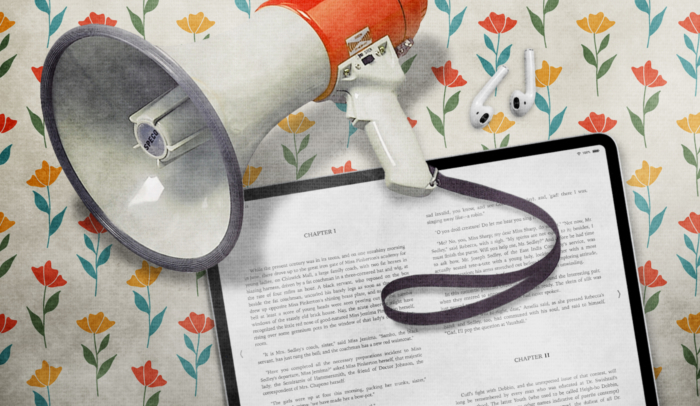Did you really write your nonfiction book just to sell books? Chances are, you didn’t.
You wrote it to get people to do something.
Maybe you want invitations to be a guest speaker. Or you want new clients. Or you want people to make a difference in their communities. Whatever you want them to do, your book is a tool to make that happen.
And with an estimated market of $19 billion by 2027, an audiobook is an effective way to speak to your core audience—literally.
But your audiobook can’t do its job until you get it in front of people. That isn‘t a simple task. In fact, according to research from Google, online consumers average 20 or more touchpoints before they buy.
That’s why your work isn’t done when you publish your audiobook. You still need to get it out there and put it to work for you.
First, produce a great audiobook for your brand
Your author brand is built around your core message. It’s who you are to your core audience and what you stand for.
- It’s what your book is about
- It’s what you talk about as a public speaker
- It’s what you post about on social media
- It’s what you offer your clients
That brand needs to come in a professional package, or people just won’t listen.
Your audiobook is a representation of your brand, so it has to be great. It needs an appealing cover, a catchy title, a strong hook, and, of course, professional production quality from the narration to the finished sound files.
If you’d like some help, Scribe Audiobook services offer professional-quality, done-for-you audiobook production and publication.
If you already have a great audiobook, here are 20 marketing tips for promoting it.
20 Ways to Promote Your Audiobook
1. Create a Landing Page for Your Audiobook
If you don’t already have one, build a landing page for your book—a web page designed around your book marketing. This is where your marketing links will send people to learn more, including links where they can buy your audiobook as well as your ebook and print books.
Add links to bookstores and other retailers where people can buy your book—like Audible, Kindle, and iTunes—and consider pulling in any great book reviews you’ve received from bloggers, Goodreads, or even professional review sites like Kirkus.
Make sure your book page is integrated with your author brand. Your personal brand is the most important thing you’re selling—not your book. Keep that in mind as you design your book page.
2. Link to Your Audiobook Everywhere You Can
Once your author website is ready, one of the best ways of marketing audiobooks is to link to your book page anywhere and everywhere. Some ideas include:
- Your automatic email signature
- Your bios on social media platforms, including LinkedIn
- Descriptions of social media groups you run
- Your blog or podcast
- Videos you create for social media or other platforms
3. Link to Your Audiobook with QR codes
QR codes are patterned square blocks that result in a specific action when they’re scanned, usually by a mobile device. For example, scanning the QR code could open your book’s landing page automatically or could play an mp3 sample of your audiobook.
Here are just a few ways to use a QR code for your book’s landing page:
- On the back of your business cards
- Embedded in your email signature
- On handouts at speaking events
You can also print a QR code for your author website inside your printed book. Every version of your book represents more exposure for your personal brand. Take advantage of that opportunity wherever you can.
4. Announce When Your Book is Available for Preorder
Whether or not you have a newsletter, everyone has an email list. It might not be formalized as a list, but you have plenty of email addresses for business colleagues, friends, and family. You probably also have access to several more emails from your contacts on LinkedIn.
Put your email list together and consider sending out an email when your audiobook is ready for preorder, but remember that sites like Amazon count sales as they come in. For the best chance of pushing your book up the charts, you’ll want most of your early sales to come in during launch week.
5. Announce When Your Audiobook Launches
To make the most of your audiobook launch, plan the cadence of your emails ahead of time. Don’t expect one email to do all the heavy lifting.
Send an email on the day your audiobook launches and plan a follow-up email two or three days later. Is your audiobook already a bestseller in a given category? Announce that as a thank-you to everyone who bought the book. Do you have a handful of rave reviews? Let your email list know what people are saying.
Send a final email near the end of your launch week, especially if you’re running any special launch week discounts or promotions. Be sure to let people know this is their last chance to get the discount before your audiobook reverts to its full retail price.
6. Include Audio Samples in Your Email Marketing
If your personal brand has a newsletter, be sure to promote the new release of your audiobook in that too. Include a link to an audio sample and your book landing page.
After the launch announcement, add your book cover image and an audio sample link to the footer of every newsletter you send out. It’s a great way to keep your book in front of people without spamming your audience.
7. Set Up an Audible Author Page
Some 38% of audiobook listeners surveyed in 2021 said they subscribe to audiobook services like Audible. Having an author page on Audible can get your book, and your personal brand, in front of new audio listeners.
Be sure to provide a professional author image and bio that match your personal brand. Your brand should be consistent everywhere: on your website, your social media, your email signature, your Audible author page, and anywhere else you have an online presence.
8. Use Audiograms and Post Snippets on Social Media
Another way to find new listeners is to post free audiobook snippets on social media so people can hear the quality of your audio format and your audiobook narrator. These don’t need to be long. They just need to give people a quick taste of your work.
When you choose the snippets you want to promote, think about your personal brand. Choose short sections that will represent your brand and resonate with your core audience.
9. Share Images and Quotes on Social Media
In promoting your audiobook on social media, don’t limit yourself to SoundCloud snippets. You can also share images and quotes from your book, or even quotes about your book from audiobook reviews.
If you don’t happen to be a gifted designer, there are plenty of free apps, such as Canva, that will let you create images from quotes, as well as provide templates for other kinds of content. It‘s a great way to break up the text in your feed with easy-to-read messaging and splashes of color.
10. Talk About Your Audiobook on Podcasts
Audiobooks are a natural fit for podcast interviews, which can play samples from your audiobook as you discuss your ideas with the podcast host.
When you’re looking for podcasts to contact, think about your own brand as well as theirs. Find podcasts that your core audience is likely to listen to, and come at the problem from different angles.
Did you write a book about financial planning for ecologically minded investors? Investigate podcasts about ecology as well as podcasts about financial planning.
Is your book about how busy mothers can launch online products to become entrepreneurs from home? Look for podcasts aimed at busy moms as well as podcasts about marketing and entrepreneurship.
Podcasts that are aimed at your core audience but not particularly at your topic may be intrigued by your book as a way to inject interesting new content that will appeal to their listeners.
11. Create an Audiobook Trailer for YouTube
Whether or not you have a strong presence on video-based social media, a professional-grade audiobook trailer on a streaming service like YouTube or Vimeo can be embedded on your book landing page, on other social media, and more.
If you’re willing to put in the time, sites like Canva or Biteable provide tools and templates to help beginners create marketing videos. Just remember that the videos you find there aren’t exclusively yours. Other authors could be creating their own trailers with the same footage.
Sites like ProductionHUB let you hire your own film crew for the day, but of course, that’s much more expensive than using free tools and doing it yourself.
One middle-of-the-road angle is to sign up for a single month of pro access to a tool like Canva or Biteable. That gives you more pro footage to choose from, with a smaller chance that someone else will use the same footage in the same way.
12. Upload a Sample Chapter to YouTube
While an audiobook trailer is designed to give readers an overview of your book and what they’ll get from reading it, a sample chapter gives readers a preview of the book itself. Each type of video can work independently, or you can use them together to attract new listeners.

If you want to upload a sample chapter, the introduction to your book is often the best choice. It’s designed to hook readers and draw them in, and you already have the audio file ready to go.
13. Use Promo Codes for Reviews and Giveaways
Some audiobook distributors provide self-publishing authors with a limited number of promo codes. Use them to get free copies into the hands of reviewers or to run giveaway promotions on your social media feeds.
Not sure where to find reviewers? There are plenty of podcasts, audiobook bloggers, and audio-centric magazines that are designed to boost audiobook sales. Look for the best fits for your brand online, or consider live networking events and conferences through organizations like the Audio Publishers Association.
14. Reach Out to Libraries or Library Listeners
Even if this is your first book, libraries are always interested in local authors, especially when it comes to nonfiction. Take a few minutes to introduce yourself and leave a business card with a QR code for your author landing page.
Once your book is in your local library, check in periodically and just say hello. Far more opportunities come from long-term friendships than a single drop-in. When someone is willing to help, remember to thank them and build on that relationship over time.
As you get to know your local librarians, they may ask you to be a guest author at local events. Librarians may also be members of larger librarian groups or email lists where they could recommend your book.
15. Promote Using Paid Advertising
Indie authors wear a lot of hats. Usually, you‘re not just the author. You‘re also the PR team and the marketing department.
When it comes to paid ads, you’ll have to do some experimenting to see what works for your particular brand and audience, but consider Facebook ads as well as Chirp.
If you haven’t heard of Chirp, they’re the audiobook arm of BookBub, offering discount book deals to millions of readers. BookBub ads are also a great way to promote your ebook.
16. Use Audiobook Promotion Services
Chirp represents a specific type of paid advertising—audiobook promotion services with large email distribution lists. Their emails can help turn your audiobook into a bestseller, at least in one or two categories for a specific distributor like iTunes or Audible.
Audiobook Boom and Audiofile Magazine are two more promotion avenues to explore, but that’s hardly an exhaustive list. Given the explosive growth of audiobooks, new sites and distribution lists are launched every year with opportunities for indie authors.
17. Discount Your Audiobook
For promotion services and lists like Chirp, your audiobook needs to be discounted to be included. Chirp’s parent service, BookBub, has a long history of successful promotions for ebooks, selling hundreds and sometimes thousands of copies in a single week.
For your best chance at being included, make sure your audiobook hasn’t been discounted for several months at the time you apply. Chirp prefers deep discounts that offer unique opportunities for their listeners.
18. Discount the Audiobook Version as an Upsell
Many authors discount their audiobook version as an upsell when someone buys their ebook. It’s so common, in fact, that the option is built into Amazon, even for indie authors.
If you’re running a discount promotion on your ebook, especially if it’s through a service like BookBub, a discounted upsell on the audiobook can make your promotion even more successful, selling more copies and making the promotion more cost-effective.
19. Bundle Your Audiobook into Box Sets

If you’ve published more than one audiobook, consider bundling them together into a box set that’s priced at a discount when compared to buying your books individually.
Most distributors won’t give you a way to do this with individual audiobooks, but you can publish a new audiobook that includes both audiobooks in one, making the bundle clear in the listing title and description.
20. Give Away Bonus Content on Authors Direct
Authors Direct is an app powered by the audiobook distributor Findaway Voices. You can use it to publish and sell audio content directly to your listeners.
You can also use it to give away free content like bonus tips or anecdotes that you didn’t include in your book. Ideally, these should use the same narrator and have the same production quality as your audiobook.
You can also use this kind of bonus content as a free offer to encourage people to subscribe to your newsletter.
Final Thoughts
Building a brand is a lot of work, but it’s worth it. Boost your brand and your marketing efforts with high-quality production and effective distribution to reach your core audience wherever they want to find you.
Give your book a voice with Scribe Audiobook service.


